Cadillac ATS 2016 Owner's Manual
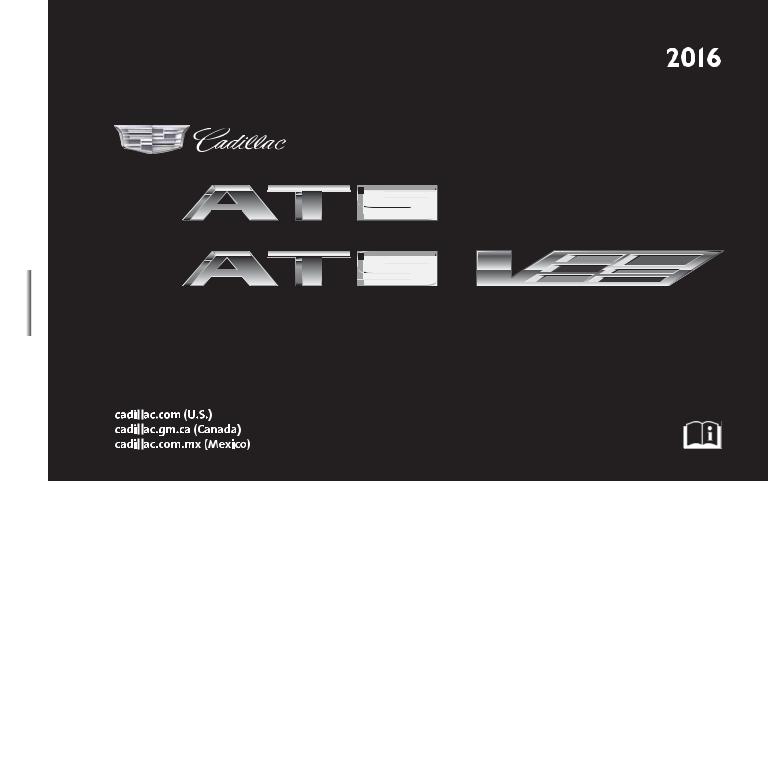

Contents
Introduction . . . . . . . . . . . . . . . . . . . . . . 2
In Brief . . . . . . . . . . . . . . . . . . . . . . . . . . . 5
Keys, Doors, and Windows . . . . . 30
Seats and Restraints . . . . . . . . . . . 53
Storage . . . . . . . . . . . . . . . . . . . . . . . 102
Instruments and Controls . . . . . . 104
Lighting . . . . . . . . . . . . . . . . . . . . . . . 160
Infotainment System . . . . . . . . . . 168
Climate Controls . . . . . . . . . . . . . . 203
Driving and Operating . . . . . . . . . 214
Vehicle Care . . . . . . . . . . . . . . . . . . 290
Service and Maintenance . . . . . 377
Technical Data . . . . . . . . . . . . . . . . 393
Customer Information . . . . . . . . . 398
Reporting Safety Defects . . . . . . 408
OnStar . . . . . . . . . . . . . . . . . . . . . . . . 411
Index . . . . . . . . . . . . . . . . . . . . 421

2Introduction
Introduction
The names, logos, emblems, slogans, vehicle model names, and vehicle body designs appearing in this manual including, but not limited to, GM, the GM logo, the CADILLAC Emblem, and CADILLAC ATS are trademarks and/or service marks of General Motors LLC, its subsidiaries, affiliates, or licensors.
For vehicles first sold in Canada, substitute the name “General Motors of Canada Limited” for Cadillac Motor Car Division wherever it appears in this manual.
This manual describes features that may or may not be on the vehicle because of optional equipment that was not purchased on the vehicle, model variants, country specifications, features/applications that may not be available in your region, or changes subsequent to the printing of this owner manual.
Refer to the purchase documentation relating to your specific vehicle to confirm the features.
Keep this manual in the vehicle for quick reference.
Canadian Vehicle Owners
Propriétaires Canadiens
A French language manual can be obtained from your dealer, at www.helminc.com, or from:
On peut obtenir un exemplaire de ce guide en français auprès du concessionnaire ou à l'adresse suivante:
Helm, Incorporated
Attention: Customer Service
47911 Halyard Drive
Plymouth, MI 48170
Using this Manual
To quickly locate information about the vehicle, use the Index in the back of the manual. It is an alphabetical list of what is in the manual and the page number where it can be found.
Litho in U.S.A. |
© 2015 General Motors LLC. All Rights Reserved. |
Part No. 22990231 B Second Printing |
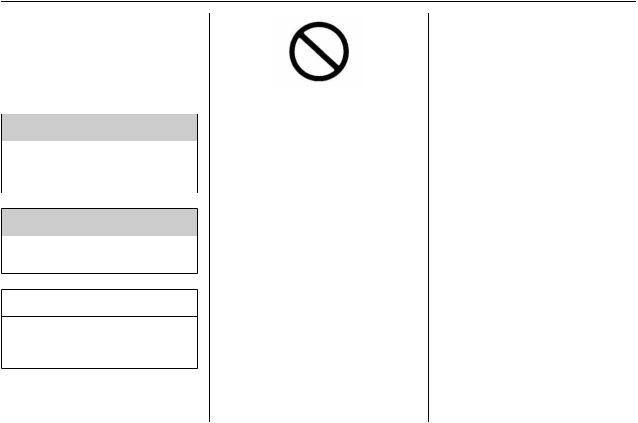
Danger, Warning, and
Caution
Warning messages found on vehicle labels and in this manual describe hazards and what to do to avoid or reduce them.
{Danger
Danger indicates a hazard with a high level of risk which will result in serious injury or death.
{Warning
Warning indicates a hazard that could result in injury or death.
Caution
Caution indicates a hazard that could result in property or vehicle damage.
A circle with a slash through it is a safety symbol which means “Do Not,” “Do not do this,” or “Do not let this happen.”
Symbols
The vehicle has components and labels that use symbols instead of text. Symbols are shown along with the text describing the operation or information relating to a specific component, control, message, gauge, or indicator.
M : Shown when the owner manual has additional instructions or information.
* : Shown when the service manual has additional instructions or information.
0 : Shown when there is more information on another page — “see page.”
Introduction 3
Vehicle Symbol Chart
Here are some additional symbols that may be found on the vehicle and what they mean. For more information on the symbol, refer to the Index.
9 : Airbag Readiness Light
# : Air Conditioning
! : Antilock Brake System (ABS)
g : Audio Steering Wheel Controls or OnStar® (if equipped)
$ : Brake System Warning Light
I : Certified Technician
" : Charging System
I : Cruise Control
` : Do Not Puncture
^ : Do Not Service
B : Engine Coolant Temperature
O : Exterior Lamps
_ : Flame/Fire Prohibited
H : Flammable
. : Fuel Gauge
+ : Fuses

4Introduction
3 : Headlamp High/Low-Beam
Changer
( : Heated Steering Wheel
j : LATCH System Child Restraints
* : Malfunction Indicator Lamp
: : Oil Pressure
O : Power
/ : Remote Vehicle Start
> : Safety Belt Reminders
7 : Tire Pressure Monitor
d : Traction Control/StabiliTrak®
a : Under Pressure
M : Windshield Washer Fluid

In Brief
Instrument Panel
Instrument Panel Overview . . . . . . 6
Initial Drive Information
Initial Drive Information . . . . . . . . . . 8
Stop/Start System . . . . . . . . . . . . . . . 8
Remote Keyless Entry (RKE)
System . . . . . . . . . . . . . . . . . . . . . . . . 8
Remote Vehicle Start . . . . . . . . . . . 9
Door Locks . . . . . . . . . . . . . . . . . . . . . 9
Trunk . . . . . . . . . . . . . . . . . . . . . . . . . . 10
Windows . . . . . . . . . . . . . . . . . . . . . . . 10
Seat Adjustment . . . . . . . . . . . . . . . 11
Memory Features . . . . . . . . . . . . . . 14
Second Row Seats . . . . . . . . . . . . 14
Heated Seats . . . . . . . . . . . . . . . . . . 14
Head Restraint Adjustment . . . . 15
Safety Belts . . . . . . . . . . . . . . . . . . . . 15
Passenger Sensing System . . . 16
Mirror Adjustment . . . . . . . . . . . . . . 16
Steering Wheel Adjustment . . . . 17
Interior Lighting . . . . . . . . . . . . . . . . 17
Exterior Lighting . . . . . . . . . . . . . . . 18
Windshield Wiper/Washer . . . . . . 19
Climate Controls . . . . . . . . . . . . . . . 19
Transmission . . . . . . . . . . . . . . . . . . 21
Vehicle Features
Infotainment System . . . . . . . . . . . 21
Radio(s) . . . . . . . . . . . . . . . . . . . . . . . 21
Satellite Radio . . . . . . . . . . . . . . . . . 22
Portable Audio Devices . . . . . . . . 22
Bluetooth® . . . . . . . . . . . . . . . . . . . . . 22
Steering Wheel Controls . . . . . . . 23
Cruise Control . . . . . . . . . . . . . . . . . 23
Driver Information
Center (DIC) . . . . . . . . . . . . . . . . . 24
Forward Collision Alert (FCA)
System . . . . . . . . . . . . . . . . . . . . . . . 24
Front Automatic Braking (FAB)
System . . . . . . . . . . . . . . . . . . . . . . . 24
Lane Keep Assist (LKA) . . . . . . . 25
Lane Change Alert (LCA) . . . . . . 25
Rear Vision Camera (RVC) . . . . 25
Rear Cross Traffic Alert (RCTA)
System . . . . . . . . . . . . . . . . . . . . . . . 25
Parking Assist . . . . . . . . . . . . . . . . . 25
Rear Automatic Braking (RAB)
System . . . . . . . . . . . . . . . . . . . . . . . 26
Power Outlets . . . . . . . . . . . . . . . . . 26
Universal Remote System . . . . . 26
Sunroof . . . . . . . . . . . . . . . . . . . . . . . . 26
In Brief |
5 |
Performance and Maintenance
Traction Control/Electronic Stability Control . . . . . . . . . . . . . . 27
Tire Pressure Monitor . . . . . . . . . . 28 Engine Oil Life System . . . . . . . . 28 Driving for Better Fuel
Economy . . . . . . . . . . . . . . . . . . . . . 29 Roadside Service . . . . . . . . . . . . . . 29
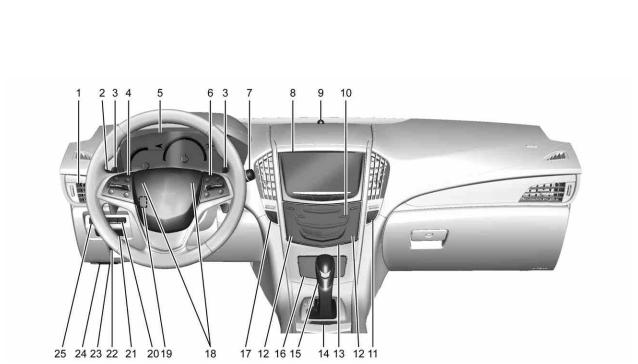
6In Brief
Instrument Panel
Instrument Panel Overview

1.Air Vents 0 212.
2.Exterior Lamp Controls 0 160.
Turn Signal Lever. See Turn and Lane-Change Signals 0 164.
3.Tap Shift Controls (If Equipped). See Manual Mode
0 241.
4.Cruise Control 0 256.
Adaptive Cruise Control 0 258
(If Equipped).
Forward Collision Alert (FCA) System 0 270 (If Equipped).
Heated Steering Wheel 0 106
(If Equipped).
Traction Control/Electronic Stability Control 0 249 (ATS-V).
Steering Wheel Controls 0 106.
5.Instrument Cluster 0 114.
Driver Information Center (DIC) Display. See Driver Information Center (DIC) 0 130.
6.Steering Wheel Controls 0 106
(If Equipped).
7.Windshield Wiper/Washer 0 107.
8.Infotainment 0 168.
9.Light Sensor. See Automatic Headlamp System 0 163.
10.Dual Automatic Climate Control System (Base) 0 203 or Dual Automatic Climate Control System (Uplevel) 0 207.
11.Hazard Warning Flashers 0 164.
12.Heated Front Seats 0 62 (If Equipped).
13.Instrument Panel Storage
0 102 (If Equipped).
Wireless Charging Pad (If Equipped) (Out of View). See
Wireless Charging 0 111.
14.Traction Control/Electronic Stability Control 0 249 (ATS).
Stop/Start Disable Button (If Equipped). See Starting the Engine 0 232.
In Brief |
7 |
Electric Parking Brake (If Equipped, Manual Transmission). See Parking Brake (Electric) 0 246 or Parking Brake (Manual) 0 248.
MODE Button (ATS only) or «
/ª Button (ATS/V only). See
Driver Mode Control 0 251.
15.Shift Lever. See Automatic Transmission 0 239 or Manual Transmission 0 242 (If Equipped).
16.Storage Bin. See Instrument Panel Storage 0 102.
17.ENGINE START/STOP Button. See Ignition Positions 0 230.
18.Horn 0 107.
19.Steering Wheel Adjustment 0 105.
20.Head-Up Display (HUD) 0 132
(If Equipped).
21.Parking Assist Button. See
Driver Assistance Systems 0 266.
Lane Keep Assist (LKA) 0 277
(If Equipped).
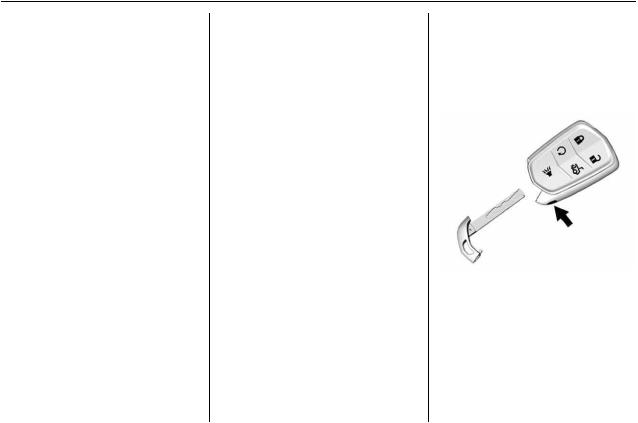
8In Brief
22.Electric Parking Brake (If Equipped, Automatic Transmission). See Parking Brake (Electric) 0 246 or Parking Brake (Manual) 0 248.
23.Data Link Connector (DLC) (Out of View). See Malfunction Indicator Lamp (Check Engine Light) 0 121.
24.Hood Release (Out of View). See Hood 0 293.
25.Instrument Panel Illumination Control 0 165.
Initial Drive
Information
This section provides a brief overview about some of the important features that may or may not be on your specific vehicle.
For more detailed information, refer to each of the features which can be found later in this owner manual.
Stop/Start System
The vehicle may have a fuel saving stop/start system to shut off the engine and help conserve fuel.
When the brakes are applied and the vehicle is at a complete stop, the engine may turn off. When the brake pedal is released or the accelerator pedal is pushed, the engine will restart.
The automatic engine stop/start function can be disabled using the switch. See Starting the Engine
0 232.
Remote Keyless Entry
(RKE) System
The RKE transmitter may be used to lock and unlock the doors from up to 60 m (197 ft) away from the vehicle.
With Remote Start Shown, Without
Similar
Q : Press to lock all doors.
K : Press to unlock the driver door or all doors, depending on the vehicle personalization settings.
See Vehicle Personalization 0 148.
7 : Press and release to initiate vehicle locator.

Press and hold 7 for three seconds to sound the panic alarm.
Press 7 again or start the vehicle to cancel the panic alarm.
X : Press twice quickly to release the trunk.
Press the key release button near the bottom of the transmitter to remove the key. The key can be used for the driver door and the glove box.
See Keys 0 30 and Remote Keyless Entry (RKE) System Operation 0 31.
Remote Vehicle Start
If equipped, the engine can be started from outside of the vehicle.
Starting the Vehicle
1.Press and release Q on the RKE transmitter.
2.Immediately press and hold / for at least four seconds or until the turn signal lamps flash.
3.Start the vehicle normally after entering.
When the vehicle starts, the parking lamps will turn on.
Remote start can be extended.
Canceling a Remote Start
To cancel a remote start, do one of the following:
.Press and hold / until the parking lamps turn off.
.Turn on the hazard warning flashers.
. Turn the vehicle on and then off.
See Remote Vehicle Start 0 37.
Door Locks
To lock or unlock a door manually:
.From the outside, if the vehicle is equipped with Keyless Access, press the button on the door handle when the Remote Keyless Entry (RKE) transmitter is within range. See Remote Keyless Entry (RKE) System Operation 0 31.
In Brief |
9 |
.Use the key in the front driver door, or if equipped, in the passenger door key cylinder. The key cylinder is covered by a cap. See Door Locks 0 39.
.From the inside, to lock a rear door, if equipped, push down on the door lock knob on top of the door. To unlock a door, pull once on the door handle to unlock it, and again to open it.
Power Door Locks
From the outside, press Q or K on the RKE transmitter. See Remote Keyless Entry (RKE) System Operation 0 31.
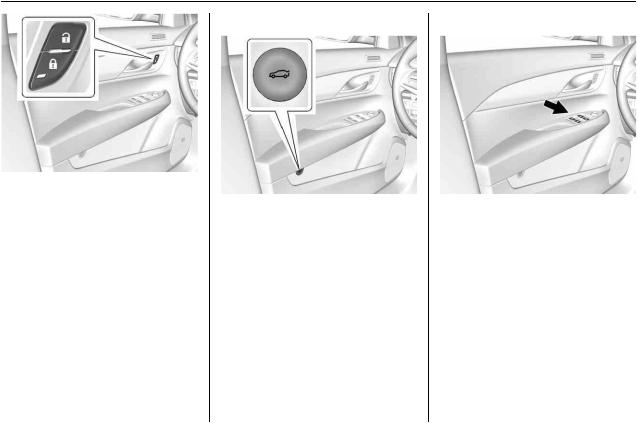
10 In Brief
Trunk |
Windows |
From the inside, press Q or K. The indicator light in the switch will illuminate when locked. See Power Door Locks 0 40.
Sedan Shown, Coupe Similar
To open the trunk, the vehicle must be off or with the shift lever in
P (Park). Press | from inside the
vehicle, press X twice quickly on the Remote Keyless Entry (RKE) transmitter, or press the touch pad on the rear of the trunk above the license plate after unlocking all doors. See Remote Keyless Entry (RKE) System Operation 0 31 and Trunk 0 42.
Sedan Shown, Coupe Similar
Press the switch to lower the window. Pull the switch up to raise it. The power windows only operate with the ignition in ACC/ ACCESSORY or ON/RUN/START, or when Retained Accessory Power (RAP) is active. See Retained Accessory Power (RAP) 0 235.
The power window switches on the driver door control all the windows. Each passenger door has a switch that controls only that window.
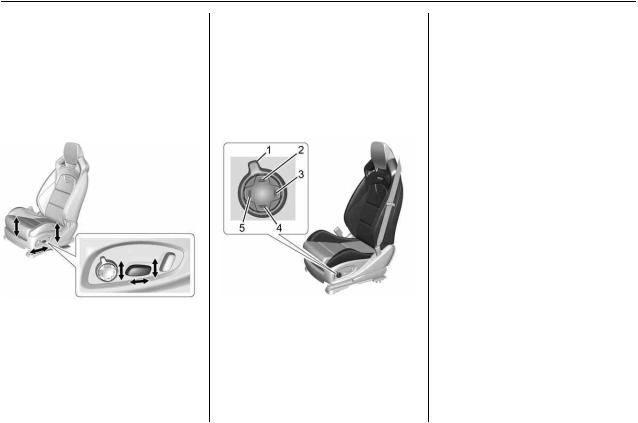
On coupe models, the windows will lower to a predetermined position. Press the switch again to lower the window fully.
See Power Windows 0 49.
Seat Adjustment
Power Seats
High Performance Seat
To adjust the seat:
.Move the seat forward or rearward by sliding the control forward or rearward.
.Raise or lower the seat by moving the rear of the control up or down.
.If equipped, raise or lower the front part of the seat cushion by moving the front of the control up or down.
V-Series Seat Adjustment
High Performance Seat
1.Feature Select
2.Up
3.Rearward
4.Down
5.Forward
In Brief |
11 |
.Move Feature Select (1) to display seat adjustments on the center stack. Press and release or hold to scroll through features.
.Press Up (2) to make upward adjustments of the selected feature.
.Press Rearward (3) to make rearward adjustments of the selected feature.
.Press Down (4) to make downward adjustments of the selected feature.
.Press Forward (5) to make forward adjustments of the selected feature.
See Power Seat Adjustment 0 56.
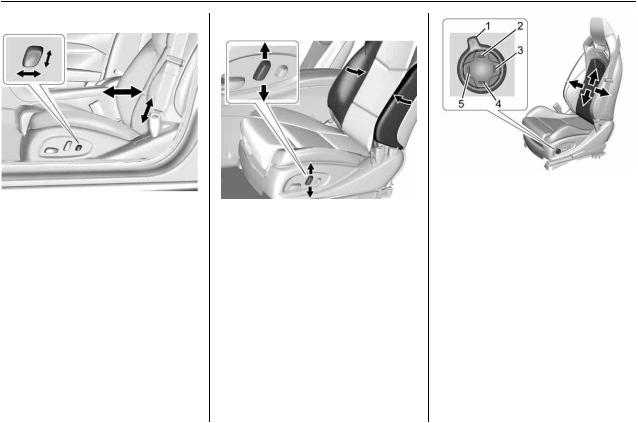
12 In Brief
Lumbar Adjustment
Base Seat
To adjust the lumbar and bolster support, if equipped:
.Press and hold the adjustment control forward or rearward to increase or decrease lumbar support.
.Press and hold the adjustment control up or down to increase or decrease seatback bolster support, if equipped.
Bolster Adjustment
If equipped, to increase or decrease the seatback bolster support, press and hold the recliner control up
and down.
See Lumbar Adjustment 0 59.
V-Series Bolster Support
4–Way Lumbar Support
To adjust lumbar support, if equipped:
High Performance Seat
.Press and release or hold Feature Select (1) to scroll to lumbar support on the center stack.
.Press Forward (5) or Rearward (3) to adjust lumbar forward or rearward.
.Press Up (2) or Down (4) to adjust lumbar support up or down.
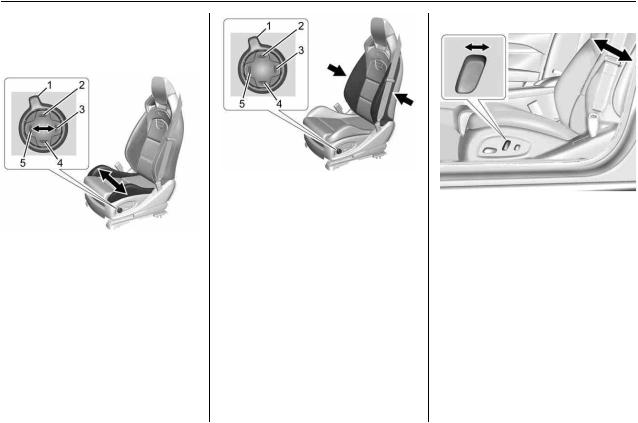
Cushion Bolster
To adjust cushion bolster support, if equipped:
.Press and release or hold Feature Select (1) to scroll to bolster support on the center stack.
.Press Forward (5) or Rearward (3) to adjust bolster support inward or outward.
Back Bolster Support
To adjust back bolster support, if equipped:
.Press and release or hold Feature Select (1) to scroll to upper back support on the center stack.
.Press Forward (5) or Rearward (3) to adjust back support forward or rearward.
In Brief |
13 |
Reclining Seatbacks
Base Seat
To adjust the seatback:
.Tilt the top of the control rearward to recline.
.Tilt the top of the control forward to raise.
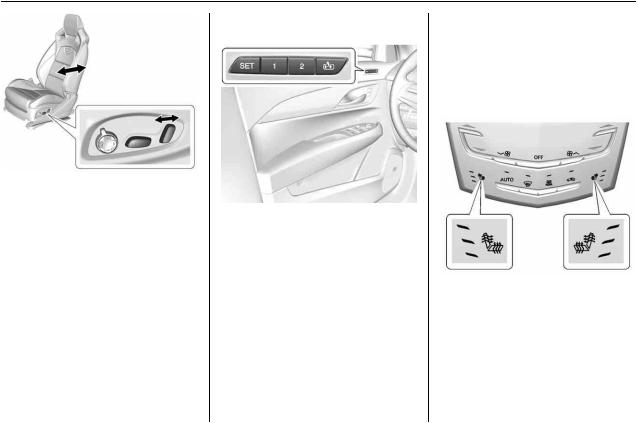
14 In Brief
Memory Features
High Performance Seat
To adjust the seatback:
.Tilt the top of the control rearward to recline.
.Tilt the top of the control forward to raise.
See Reclining Seatbacks 0 59.
If equipped, the 1, 2, SET, and B (Exit) buttons on the driver door are used to manually save and recall memory settings for the driver seat and outside mirrors.
Automatic Memory Recall and/or Easy Exit Recall features may be enabled in the vehicle personalization menus to automatically recall positions stored
to the 1, 2, and B buttons.
See Memory Seats 0 60 and
Vehicle Personalization 0 148.
Second Row Seats
The rear seatbacks can be folded down to increase cargo space.
See Rear Seats 0 63.
Heated Seats
Uplevel Buttons Shown, Base
Buttons Similar
If available, the buttons are near the climate controls on the center stack. To operate, the ignition must be in ON/RUN/START.
Press J /M or z /L to heat the driver or passenger seat cushion and seatback.
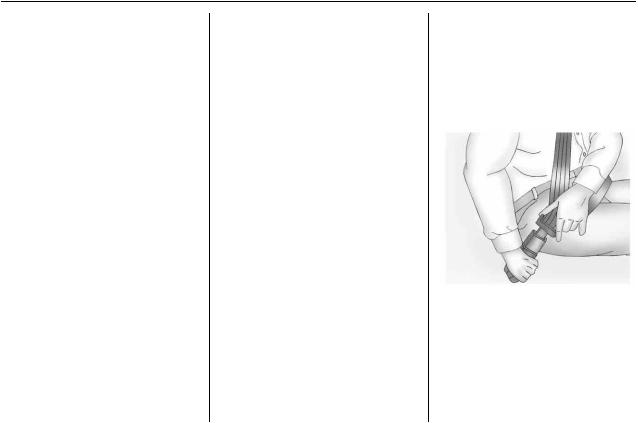
Press the button once for the highest setting. With each press of the button, the seat will change to the next lower setting, and then to the off setting. The indicator lights next to the buttons indicate three for the highest setting and one for the lowest. If the heated seats are on high, the level may automatically be lowered after approximately
30 minutes.
See Heated Front Seats 0 62.
Auto Heated Seats
When the vehicle is on, this feature will automatically activate the heated seats at the level required by the vehicle’s interior temperature.
The active high, medium, low, or off heated seat level will be indicated by the manual heated seat buttons on the center stack. Use the manual heated seat buttons on the center stack to turn auto heated seats off.
If the passenger seat is unoccupied, the auto heated seats feature will not activate that seat. The auto
heated seats feature can be programmed to always be enabled when the vehicle is on.
The heated seats will not turn on during a remote start unless they are enabled in the vehicle personalization menu.
See Vehicle Personalization 0 148.
Head Restraint
Adjustment
If equipped with base seats, the vehicle’s front seats have adjustable head restraints in the outboard seating positions.
If equipped with high performance seats, the vehicle’s front seats have head restraints in the outboard seating positions that cannot be adjusted.
Do not drive until the head restraints for all occupants are installed and adjusted properly.
To achieve a comfortable seating position, change the seatback recline angle as little as necessary
In Brief |
15 |
while keeping the seat and the head restraint height in the proper position.
See Head Restraints 0 54 and Power Seat Adjustment 0 56.
Safety Belts
Refer to the following sections for important information on how to use safety belts properly:
.Safety Belts 0 65.
.How to Wear Safety Belts Properly 0 66.
.Lap-Shoulder Belt 0 67.
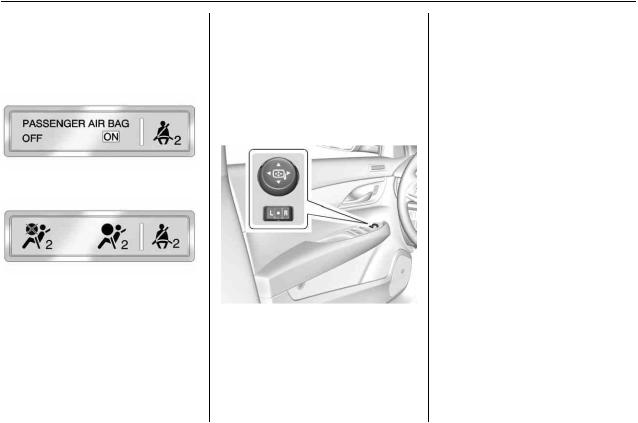
16 In Brief
.Lower Anchors and Tethers for Children (LATCH System) 0 90.
Passenger Sensing
System
United States
Canada and Mexico
The passenger sensing system will turn off the front outboard passenger frontal airbag and knee airbag under certain conditions. No other airbag is affected by the passenger sensing system. See
Passenger Sensing System 0 77.
The passenger airbag status indicator lights on the overhead console are visible when the vehicle is started. See Passenger Airbag Status Indicator 0 120.
Mirror Adjustment
Exterior Mirrors
1.Move the selector switch to L (Left) or R (Right) to choose the driver or passenger mirror.
2.Press one of the four arrows to move the mirror.
3.Move the selector switch to ) to deselect the mirror.
The vehicle has manual folding mirrors. See Folding Mirrors 0 48.
Interior Mirrors
Adjustment
Adjust the rearview mirror for a clear view behind the vehicle.
Manual Rearview Mirror
For vehicles with a manual rearview mirror, push the tab forward for daytime use and pull it for nighttime use to avoid glare from the headlamps from behind. See
Manual Rearview Mirror 0 49.
Automatic Dimming Rearview
Mirror
For vehicles with an automatic dimming rearview mirror, the mirror will automatically reduce the glare from the headlamps from behind. The dimming feature comes on when the vehicle is started. See
Automatic Dimming Rearview Mirror 0 49.
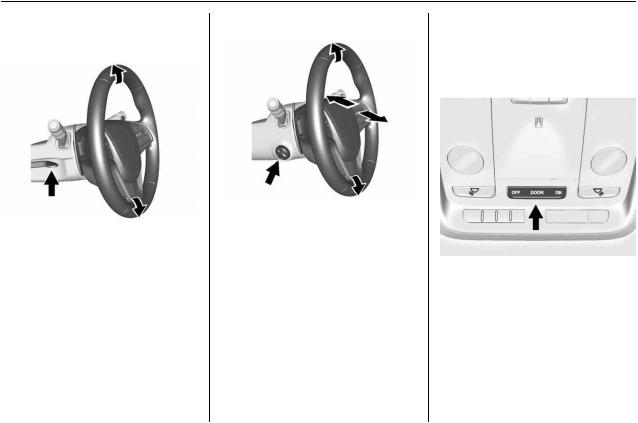
Steering Wheel
Adjustment
To adjust the steering wheel:
1.Pull the lever down.
2.Move the steering wheel up or down.
3.Pull or push the steering wheel closer or away from you.
4.Pull the lever up to lock the steering wheel in place.
Power Tilt and Telescoping Wheel
If equipped, the control is on the left side of the steering column.
.Push the control up or down to tilt the steering wheel up
or down.
.Push the control forward or rearward to move the steering wheel toward the front or rear of the vehicle.
Do not adjust the steering wheel while driving.
To set the power tilt wheel memory position, see Memory Seats 0 60.
In Brief |
17 |
Interior Lighting
Dome Lamp
The dome lamp is in the overhead console.
To change the dome lamp settings, press the following:
OFF : Turns the lamp off, even when a door is open.
DOOR : The lamp comes on when a door is opened.
ON : Turns the lamp on.
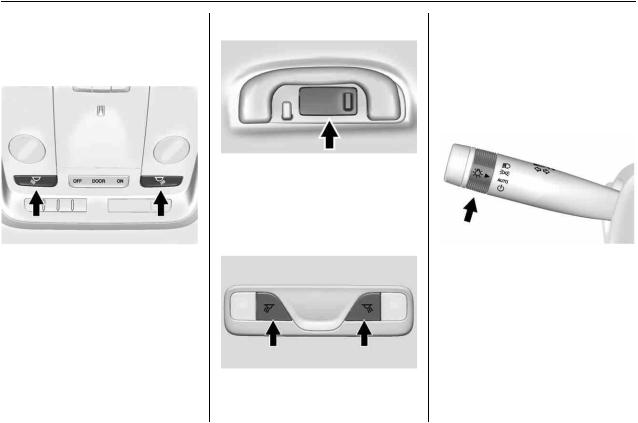
18 In Brief
Reading Lamps
There are front and rear reading lamps. These lamps come on when any door is opened.
The front reading lamps are in the overhead console.
Press m or n to turn the lamps on or off.
Sedan
The rear reading lamps are over the rear passenger doors.
Press the lamp lens to turn the rear passenger reading lamps on or off.
Coupe
The rear reading lamps are in the headliner.
Press m or n to turn the lamps on or off.
For more information on interior lighting, see Instrument Panel Illumination Control 0 165.
Exterior Lighting
The exterior lamp control is on the turn signal lever.
Turn the control to the following positions:
O : Turns off the exterior lamps. The knob returns to the AUTO position after it is released. Turn to O again to reactivate the AUTO mode. In Canada, the headlamps will automatically reactivate when the vehicle is shifted out of P (Park) on automatic transmission vehicles,
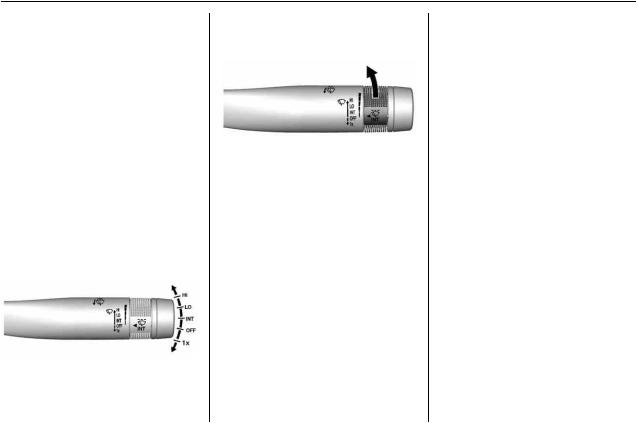
and when the parking brake is released on manual transmission vehicles.
AUTO : Automatically turns the exterior lamps on and off, depending on outside lighting.
; : Turns on the parking lamps including all lamps, except the headlamps.
5 : Turns on the headlamps together with the parking lamps and instrument panel lights.
See Exterior Lamp Controls 0 160 and Daytime Running Lamps (DRL) 0 163.
Windshield Wiper/Washer
With the ignition in ACC/ ACCESSORY or ON/RUN/START, move the lever to select the wiper speed.
HI : Use for fast wipes.
LO : Use for slow wipes.
INT : Use this setting for intermittent wipes or Rainsense™, if equipped. For intermittent wipes, move the windshield wiper lever to INT. Turn
the x INT band up for more frequent wipes or down for less frequent wipes.
If equipped with Rainsense and the feature is enabled in vehicle personalization, move the windshield wiper lever to INT and
turn the x INT band to adjust the sensitivity to moisture.
.Turn the band up for more sensitivity to moisture.
.Turn the band down for less sensitivity to moisture.
In Brief |
19 |
.Move the windshield wiper lever out of the INT position to deactivate Rainsense.
To turn the Rainsense feature on or off, see “Rain Sense Wipers” under
Vehicle Personalization 0 148.
OFF : Use to turn the wipers off.
1X : For a single wipe, briefly move the lever down. For several wipes, hold the lever down.
n L : Pull the lever toward you to spray windshield washer fluid and activate the wipers.
See Windshield Wiper/Washer 0 107.
Climate Controls
If equipped with one of these systems, it controls the heating, cooling, and ventilation.
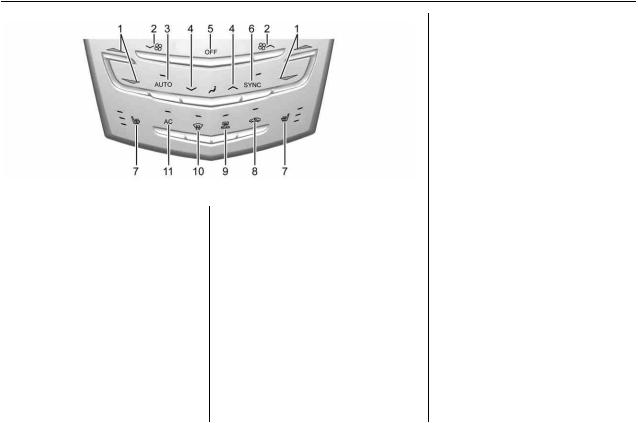
20 In Brief
|
|
Base |
|
1. |
Driver and Passenger |
7. |
Driver and Passenger Heated |
|
Temperature Controls |
|
Seats (If Equipped) |
2. |
Fan Control |
8. |
Recirculation |
3. |
AUTO (Automatic Operation) |
9. |
Rear Window Defogger |
4. |
Air Delivery Mode Control |
10. |
Defrost |
5. |
OFF (Fan) |
11. |
AC (Air Conditioning) |
6.SYNC (Synchronized Temperature)
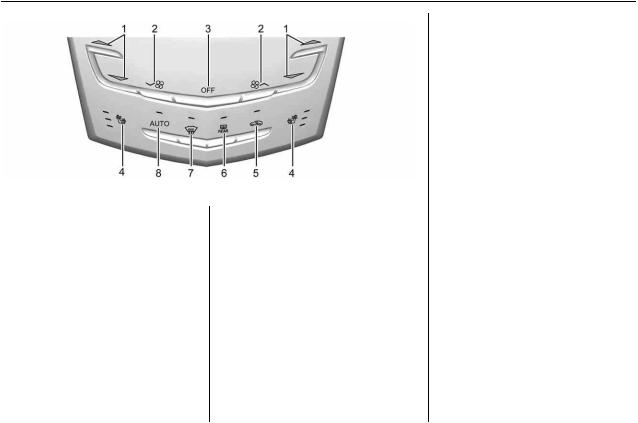
1.Driver and Passenger Temperature Controls
2.Fan Control
3.OFF (Fan)
Uplevel
See Dual Automatic Climate Control System (Base) 0 203 or Dual Automatic Climate Control System (Uplevel) 0 207.
4.Driver and Passenger Heated Seats (If Equipped)
5.Recirculation
6.Rear Window Defogger
7.Defrost
8.AUTO (Automatic Operation)
Transmission
Driver Shift Control (DSC) or Tap Shift
Vehicles equipped with DSC allow shifting an automatic transmission similar to a manual transmission.
DSC can be enabled through the shift lever, or the tap shift controls on the back of the steering wheel (if equipped). See Manual Mode 0 241.
In Brief |
21 |
Vehicle Features
Infotainment System
See the infotainment manual for information on the radio, audio players, phone, navigation system, and voice or speech recognition. There is also information on settings and downloadable applications (if equipped).
Radio(s)
O : Press to turn the system on and off. Turn to increase or decrease the volume.
RADIO : Press to choose between FM, AM, and SiriusXM®,
if equipped.
{ : Press to go to the Home Page.
MENU : Press to select a menu.
MEDIA : Press to change the audio source between CD, USB, SD Card, and AUX.
7 : Press to seek the previous station or track.

22 In Brief
6 : Press to seek the next station or track.
See Overview 0 170 about these and other radio features.
Favorites
Favorites can be stored including radio stations and media.
To display the favorites page, press the FAV button on the radio faceplate. Continue pressing the FAV button to toggle through the remaining visible favorite pages.
See “Manage Favorites” in “Radio Setup” under Home Page 0 171.
Setting the Clock
See Clock (Base Radio) 0 109 or Clock (Uplevel Radio) 0 109.
Satellite Radio
Vehicles with a SiriusXM® satellite radio tuner and a valid SiriusXM satellite radio subscription can receive SiriusXM programming.
SiriusXM Satellite Radio
Service
SiriusXM is a satellite radio service based in the 48 contiguous United States and 10 Canadian provinces. SiriusXM satellite radio has a wide variety of programming and commercial-free music, coast to coast, and in digital-quality sound. A fee is required to receive the SiriusXM service.
For more information refer to:
.www.siriusxm.com or call 1-866-635-2349 (U.S.).
.www.xmradio.ca or call 1-877-209-0079 (Canada).
See Satellite Radio 0 176.
Portable Audio Devices
This vehicle has a 3.5 mm (1/8 in) auxiliary input and a USB port in the center console under the armrest, and if equipped, one USB port in the storage behind the climate control system. See Instrument Panel Storage 0 102. External devices such as iPods®, laptop computers, MP3 players, CD changers, and
USB storage devices may be connected, depending on the audio system.
See Auxiliary Jack 0 184 and USB
Port 0 181.
Bluetooth®
The Bluetooth system allows users with a Bluetooth-enabled cell phone to make and receive hands-free calls using the vehicle audio system and controls.
The Bluetooth-enabled cell phone must be paired with the in-vehicle Bluetooth system before it can be used in the vehicle. Not all phones will support all functions.
See Bluetooth (Infotainment Controls) 0 192 or Bluetooth (Voice Recognition) 0 196 or Bluetooth (Overview) 0 191.
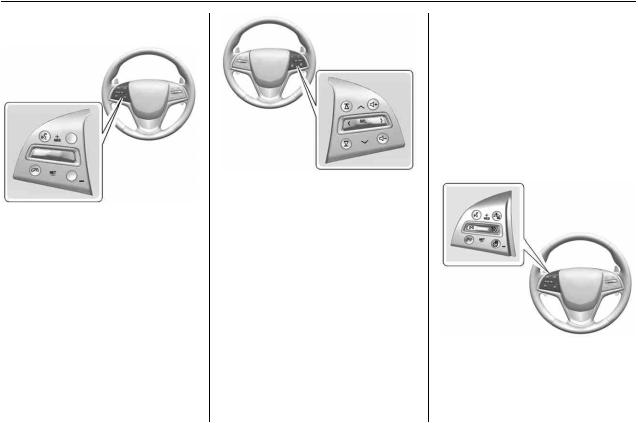
Steering Wheel Controls
If equipped with audio steering wheel controls, some audio controls can be adjusted at the steering wheel.
g : Press to talk or interact with OnStar® and Bluetooth®. See
OnStar Overview 0 411 and Bluetooth (Infotainment Controls) 0 192 or Bluetooth (Voice Recognition) 0 196 or Bluetooth (Overview) 0 191.
i : Press to decline an incoming call, or end a current call. Press to mute or unmute the infotainment system.
S or T: Press the five-way control to the left or right to go to the previous or next area in the display or to the previous or next menu.
y or z : Press the five-way control up or down to go up or down in a list. Press to go up or down
a page.
SEL : Press to select a highlighted menu item.
C or B : Press or press and hold to go to the next or previous favorite or seek a station when listening to the radio.
In Brief |
23 |
Press or press and hold to go to the next or previous track when listening to a media source.
These buttons can be configured, see Instrument Cluster 0 114.
x + or x − : Press to increase or decrease the volume.
See Steering Wheel Controls 0 106.
Cruise Control
J : Press to turn the system on and off. A white cruise control indicator appears in the instrument cluster when cruise is turned on.
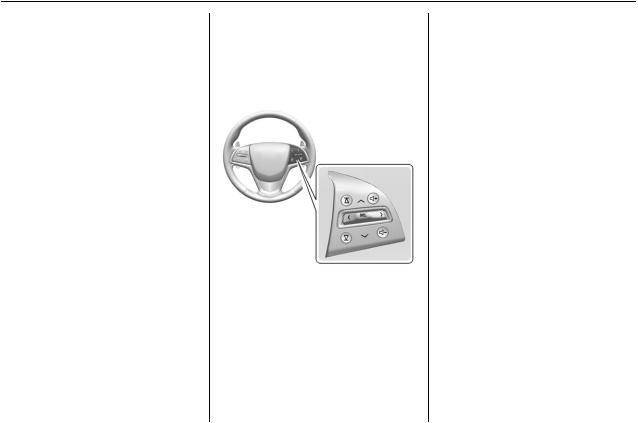
24 In Brief
+RES : If there is a set speed in memory, press the control up briefly to resume to that speed or hold to accelerate. If cruise control is already active, use to increase vehicle speed. To increase speed by 1 km/h (1 mph), press +RES up to the first detent. To increase speed to the next 5 km/h (5 mph) mark on the speedometer, press +RES up to the second detent.
SET− : Press the control down briefly to set the speed and activate cruise control. If cruise control is already active, use to decrease vehicle speed. To decrease speed by 1 km/h (1 mph), press SET− down to the first detent. To decrease speed to the next 5 km/h (5 mph) mark on the speedometer, press SET− down to the second detent.
* : Press to disengage cruise control without erasing the set speed from memory.
See Cruise Control 0 256 or Adaptive Cruise Control 0 258 (if equipped).
Driver Information
Center (DIC)
The DIC display is in the instrument cluster. It shows the status of many vehicle systems.
y or z : Press to move up or down in a list.
S or T: Press to move between the interactive display zones in the
cluster. Press S to go back to the previous menu.
SEL : Press to open a menu or select a menu item. Press and hold to reset values on certain screens.
See Driver Information Center (DIC) 0 130.
Forward Collision Alert
(FCA) System
If equipped, FCA may help avoid or reduce the harm caused by front-end crashes. FCA provides a
green indicator, V, when a vehicle is detected ahead. This indicator displays amber if you follow a vehicle much too closely. When approaching a vehicle ahead too quickly, FCA provides a flashing red alert on the windshield and rapidly beeps or pulses the driver seat.
See Forward Collision Alert (FCA)
System 0 270.
Front Automatic Braking
(FAB) System
If the vehicle has Adaptive Cruise Control (ACC), it also has FAB, which includes Intelligent Brake Assist (IBA). When the system detects a vehicle ahead in your path that is traveling in the same direction that you may be about to

crash into, it can provide a boost to braking or automatically brake the vehicle. This can help avoid or lessen the severity of crashes when driving in a forward gear.
See Front Automatic Braking (FAB)
System 0 273.
Lane Keep Assist (LKA)
If equipped, LKA may help avoid crashes due to unintentional lane departures. It may assist by gently turning the steering wheel if the vehicle approaches a detected lane marking without using a turn signal in that direction. It may also provide a Lane Departure Warning (LDW) alert as the lane marking is crossed. The system will not assist or alert if it detects that you are actively steering. Override LKA by turning the steering wheel. LKA uses a camera to detect lane markings between 60 km/h (37 mph) and
180 km/h (112 mph).
See Lane Departure Warning (LDW) 0 276 and Lane Keep Assist (LKA) 0 277.
Lane Change Alert (LCA)
If equipped, the LCA system is a lane-changing aid that assists drivers with avoiding lane change crashes that occur with moving vehicles in the side blind zone (or spot) areas or with vehicles rapidly approaching these areas from behind. The LCA warning display will light up in the corresponding outside side mirror and will flash if the turn signal is on. The Side Blind Zone Alert (SBZA) system is included as part of the LCA system.
See Side Blind Zone Alert (SBZA) 0 274 and Lane Change Alert (LCA) 0 275.
Rear Vision
Camera (RVC)
If equipped, RVC displays a view of the area behind the vehicle on the center stack display when the vehicle is shifted into R (Reverse) to aid with parking and low-speed backing maneuvers.
See Assistance Systems for Parking or Backing 0 266.
In Brief |
25 |
Rear Cross Traffic Alert
(RCTA) System
If equipped, the RCTA system uses a triangle with an arrow displayed on the RVC screen to warn of traffic behind your vehicle that may cross your vehicle's path while in
R (Reverse). In addition, beeps will sound, or the driver seat will pulse.
See Assistance Systems for Parking or Backing 0 266.
Parking Assist
If equipped, Rear Parking
Assist (RPA) uses sensors on the rear bumper to assist with parking and avoiding objects while in
R (Reverse). It operates at speeds less than 8 km/h (5 mph). RPA may display a warning triangle on the Rear Vision Camera screen and a graphic on the instrument cluster to provide the object distance. In addition, multiple beeps or seat pulses may occur if very close to an object.
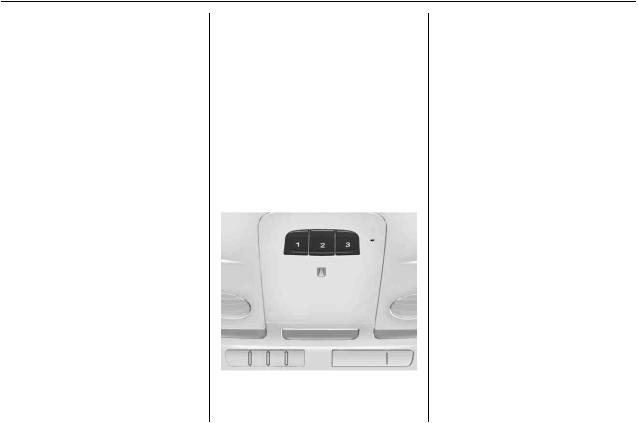
26 In Brief
The vehicle may also have the Front Parking Assist system.
See Assistance Systems for Parking or Backing 0 266.
Rear Automatic Braking
(RAB) System
If the vehicle has Adaptive Cruise Control (ACC) it also has the RAB system, which is designed to help avoid or reduce the harm caused by backing crashes when the vehicle is shifted into R (Reverse). If the system detects the vehicle is backing too fast to avoid a crash with a detected object behind your vehicle in your path, it may automatically brake hard to a stop.
See Assistance Systems for Parking or Backing 0 266.
Power Outlets
The accessory power outlets can be used to plug in electrical equipment, such as a cell phone or MP3 player.
The vehicle has two accessory power outlets:
.Inside the front storage bin below the climate control system.
.On the rear of the center floor console.
Lift the cover to access the accessory power outlet.
See Power Outlets 0 110.
Universal Remote System
If equipped, this system provides a way to replace up to three remote control transmitters used to activate
devices such as garage door openers, security systems, and home automation devices.
Read the instructions completely before attempting to program the Universal Remote system. Because of the steps involved, it may be helpful to have another person available to assist you with programming the Universal Remote system.
See Universal Remote System 0 156.
Sunroof
If equipped, the ignition must be in ON/RUN/START or ACC/ ACCESSORY, or Retained Accessory Power (RAP) must be active, to operate the sunroof. See
Ignition Positions 0 230 and Retained Accessory Power (RAP) 0 235.
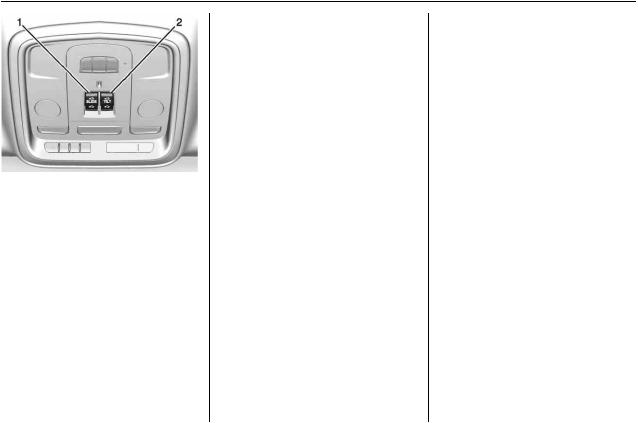
1.SLIDE Switch
2.TILT Switch
Open/Close : Press the rear or front of the switch (1) to the first detent and hold to open or close the sunroof.
Express Open/Express Close :
Press the rear or front of the switch (1) to the second detent and release to express open or express close the sunroof.
Vent Feature : Press the rear of the switch (2) and release to express open the vent. Press the front of the switch (2) and release to express close the vent.
Manually open the sunshade.
See Sunroof 0 52.
In Brief |
27 |
Performance and
Maintenance
Traction Control/
Electronic Stability
Control
The traction control system limits wheel spin. The system is on when the vehicle is started.
The StabiliTrak system assists with directional control of the vehicle in difficult driving conditions. The system is on when the vehicle is started.
.To turn off traction control, press and release g on the center console (ATS) or the steering wheel (ATS-V). i illuminates in the instrument cluster and the appropriate DIC message displays. See Ride Control System Messages 0 143.
.Press and release g again to turn traction control back on.

28 In Brief
.To turn off both Traction Control and StabiliTrak, press and hold
g on the center console (ATS) or the steering wheel (ATS-V)
until g and i illuminate in the instrument cluster. The appropriate DIC message displays. See Ride Control System Messages 0 143.
.Press and release g again to turn on both systems.
See Traction Control/Electronic
Stability Control 0 249.
The vehicle has Driver Mode Control and may have Competitive Driving Mode. See Driver Mode Control 0 251 and Competitive Driving Mode (LF4 and V-Series Only) 0 252.
Tire Pressure Monitor
This vehicle may have a Tire Pressure Monitor System (TPMS).
The low tire pressure warning light alerts to a significant loss in pressure of one of the vehicle's tires. If the warning light comes on, stop as soon as possible and inflate the tires to the recommended pressure shown on the Tire and Loading Information label. See
Vehicle Load Limits 0 226. The warning light will remain on until the tire pressure is corrected.
The low tire pressure warning light may come on in cool weather when the vehicle is first started, and then turn off as the vehicle is driven. This may be an early indicator that the tire pressures are getting low and the tires need to be inflated to the proper pressure.
The TPMS does not replace normal monthly tire maintenance. Maintain the correct tire pressures.
See Tire Pressure Monitor System 0 341.
Engine Oil Life System
The engine oil life system calculates engine oil life based on vehicle use and displays the CHANGE ENGINE OIL SOON message when it is time to change the engine oil and filter.
The oil life system should be reset to 100% only following an oil change.
Resetting the Oil Life System
1.Using the DIC controls on the right side of the steering wheel, display REMAINING OIL LIFE on the DIC. See Driver Information Center (DIC) 0 130. When remaining oil life is low, the CHANGE ENGINE OIL SOON message will appear on the display. See Engine Oil Messages 0 138.
2.Press SEL on the DIC controls and hold SEL down for a few seconds to clear the CHANGE ENGINE OIL SOON message and reset the oil life at 100%.

Be careful not to reset the oil life display accidentally at any time other than after the oil is changed. It cannot be reset accurately until the next oil change.
The oil life system can also be reset as follows:
1.Turn the ignition on with the engine off.
2.Fully press and release the accelerator pedal three times within five seconds.
If the CHANGE ENGINE OIL SOON message is not on, the system is reset.
See Engine Oil Life System 0 303.
Driving for Better Fuel Economy
Driving habits can affect fuel mileage. Here are some driving tips to get the best fuel economy possible.
.Avoid fast starts and accelerate smoothly.
.Brake gradually and avoid abrupt stops.
.Avoid idling the engine for long periods of time.
.When road and weather conditions are appropriate, use cruise control.
.Always follow posted speed limits or drive more slowly when conditions require.
.Keep vehicle tires properly inflated.
.Combine several trips into a single trip.
.Replace the vehicle's tires with the same TPC Spec number molded into the tire's sidewall near the size.
.Follow recommended scheduled maintenance.
In Brief |
29 |
Roadside Service
U.S.: 1-800-224-1400
Canada: 1-800-882-1112
TTY Users (U.S. Only): 1-888-889-2438
New Cadillac owners are automatically enrolled in the Roadside Service Program.
See Roadside Service 0 401.
